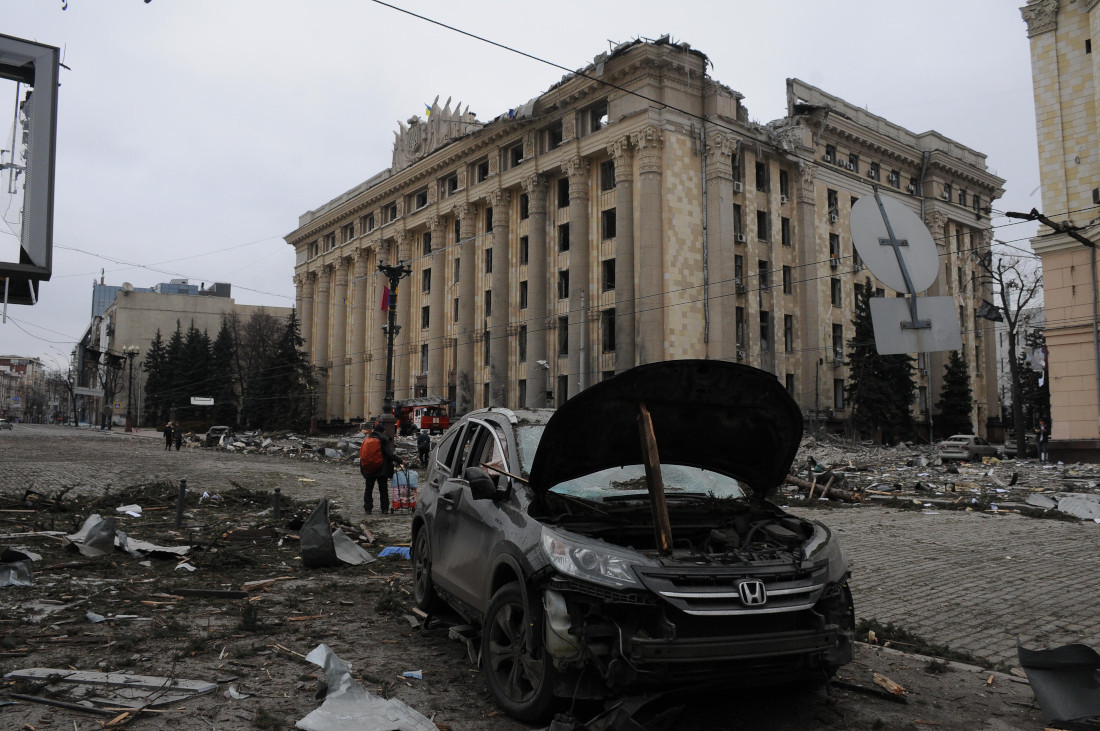Sorrow in Ukraine
Last week, on Feb. 24, Russia began a full-scale invasion of Ukraine. It’s an event many of us in the diaspora have spent much of the last decade warning could happen, while hoping that it never would.
Our fears were well-founded. Russia has been invading and occupying parts of Ukraine since 2014. In the past year, Russian president Vladimir Putin has drastically ramped up his anti-Ukrainian rhetoric, ranting in both essays and speeches that both the Ukrainian people and the country of Ukraine don’t really exist, or have the right to exist has offered distorted and outright invented histories claiming that Vladimir Lenin invented Ukraine and falsely claimed that the centrist government of Volodymyr Zelenskyy, a Jewish Ukrainian and descendant of Holocaust survivors, is a “band of drug addicts and neo-Nazis.”
Since the end of the First World War, Ukraine has been invaded eight times during three separate conflicts (the Ukrainian War of Independence, the Second World War and the current Russo-Ukrainian War). Five of those invasions have been perpetrated by Russia (the other three being varying combinations of Germany, Hungary and Romania).
We warned it was possible, but when it finally happened, there was no feeling of vindication at having been right. There is only sorrow. Sorrow, pain, anger and, above all else, fear. Fear for the safety of my loved ones who still live in The Old Country. For their democracy and independence from the colonial Russian empire that occupied them for so long. For the safety of the many peoples of Ukraine – ethnic Ukrainians, Russians, Jews, Tatars, Romani, Poles, Romanians, Armenians, and many others – who are united against Putin’s campaign of slaughter.
We speak with our cousins as often as we can to ensure that everyone is alive and, relatively speaking, safe. Their story isn’t mine to tell. I can only speak to my own experience, which is one of heartbreak. It’s the same heartbreak that diasporic Chechens, Georgians and Syrians have felt when Putin sent his armies and private death squads.
It’s an experience of sleepless nights, endlessly refreshing newsfeeds and social-media timelines, trying to get any updates I can while weeding out the sickening posts from the Trumpian right-wing authoritarians and the “dirtbag left” who regurgitate Putin’s propaganda and conspiracy theories about Ukraine the same way they did about Syria.
It’s an experience of physical illness and deep rage every time new images come in of indiscriminate bombing of civilian infrastructure, of cruise missiles striking Freedom Square in Kharkiv, the bodies of innocent Ukrainians bleeding in the streets or sick children receiving cancer treatment in bomb shelters.
It’s an experience of inspiration at the unity and resolve among the Ukrainian people to resist their fascist invaders, whether that’s through the work of defensive forces, guerilla tactics by ordinary people or grumpy old Babas and Gigis simply hurling insults at the occupying forces. A complicated sadness for the Russian soldiers, young boys who will die needlessly for a war the Russian people don’t want. For the Ukrainian, Russian and Belarusian kids who will grow up without their parents, or parents who will outlive their children, because of one vile dictator’s imperial and genocidal ambitions.
It’s a feeling of absolute pride in the heroic actions of Ukrainian president Volodymyr Zelenskyy, who has shown a degree of grace, effectiveness and integrity that I never could have imagined would emerge from this bloody and unnecessary conflict. It’s an experience of empathy, during which I’ve received messages of support from friends and acquaintances of many backgrounds from around the world, including Russia and Venezuela.
It’s an experience of unexpected emotions. Welling up at expressions of solidarity from Indigenous Canadians, many of whom have dawned kokum scarves in an acknowledgement of the cultural exchanges that took place between Cree peoples and early Ukrainian-Canadian settlers.
It’s a story I’m familiar with. My great-great grandparents John and Anastasia Ewonchuk forged these same relationships, trading bushels of wheat with their Cree neighbours so they could serve meat at their wedding. Another story, about Ukrainians who adopted a freezing stray puppy and named him Rambo, made me gasp out loud. By sheer coincidence, my Ukrainian grandfather also had a dog named Rambo.
But, ultimately, it is an experience of sorrow, that the Ukrainian people once again must suffer and fight for the independence they deserve.
The Canadian Red Cross is accepting donations for humanitarian aid to Ukraine. The Canadian government is matching these donations up to $10 million. To donate, visit bit.ly/36MG8MQ.
Published in Volume 76, Number 19 of The Uniter (March 2, 2022)







